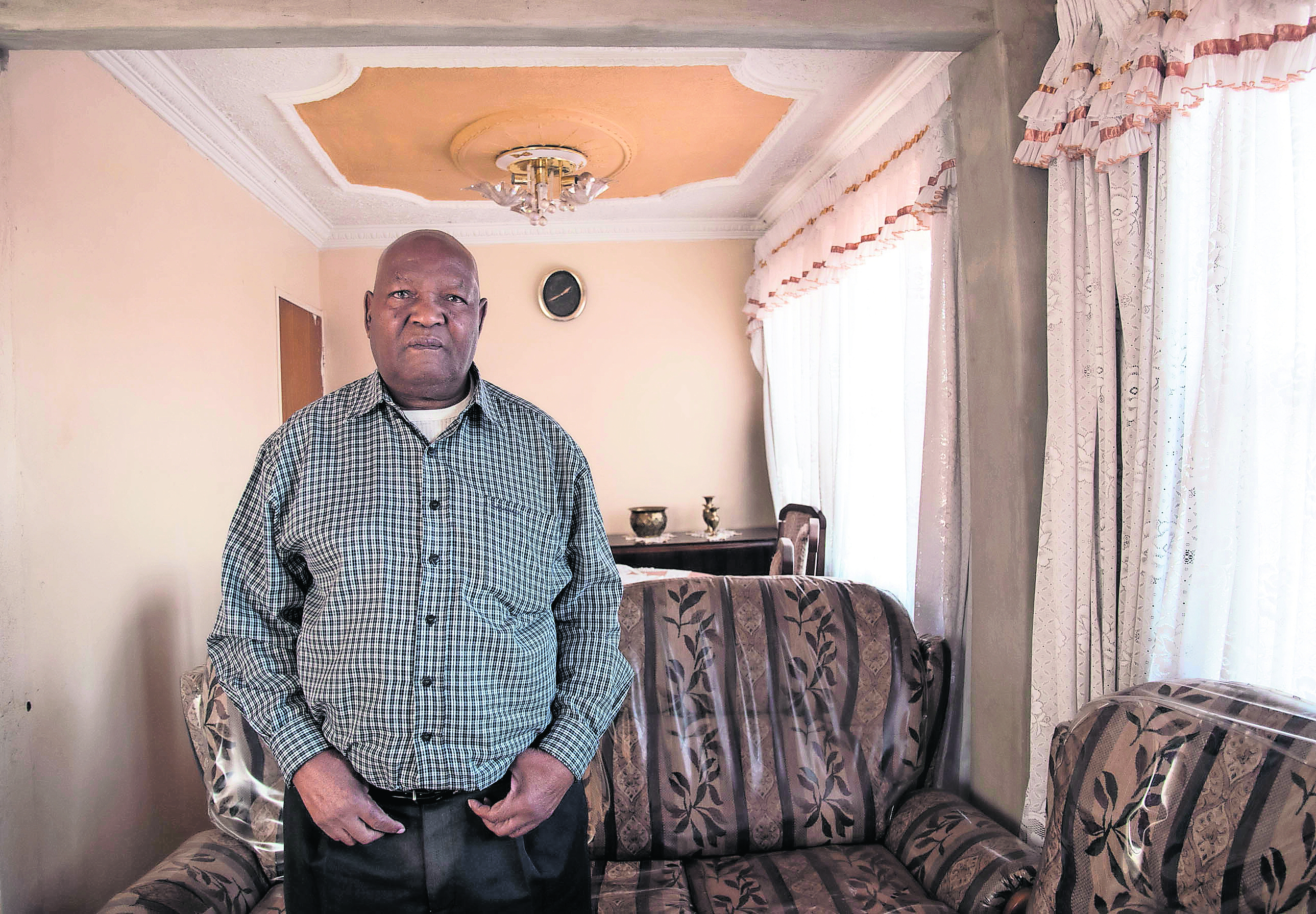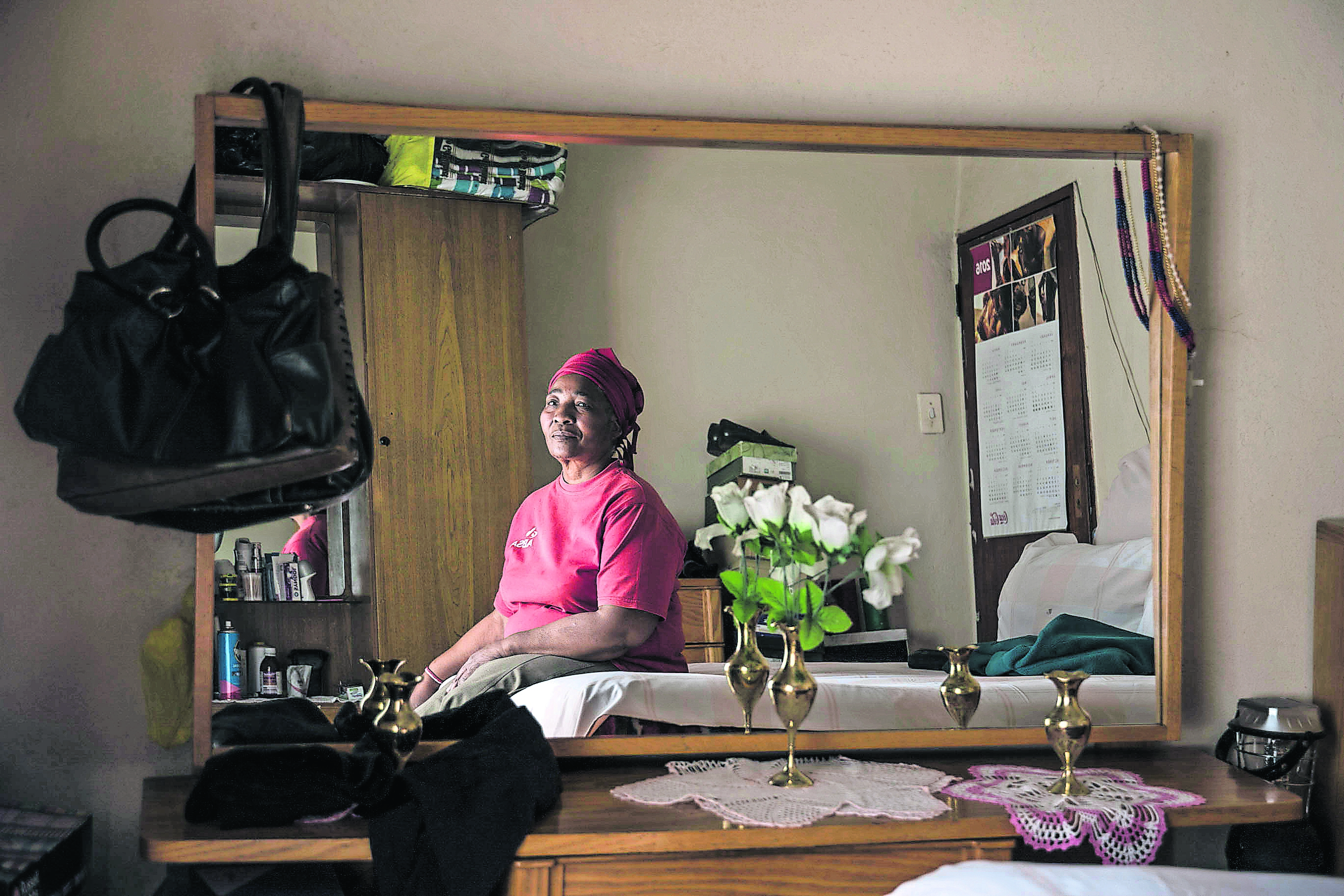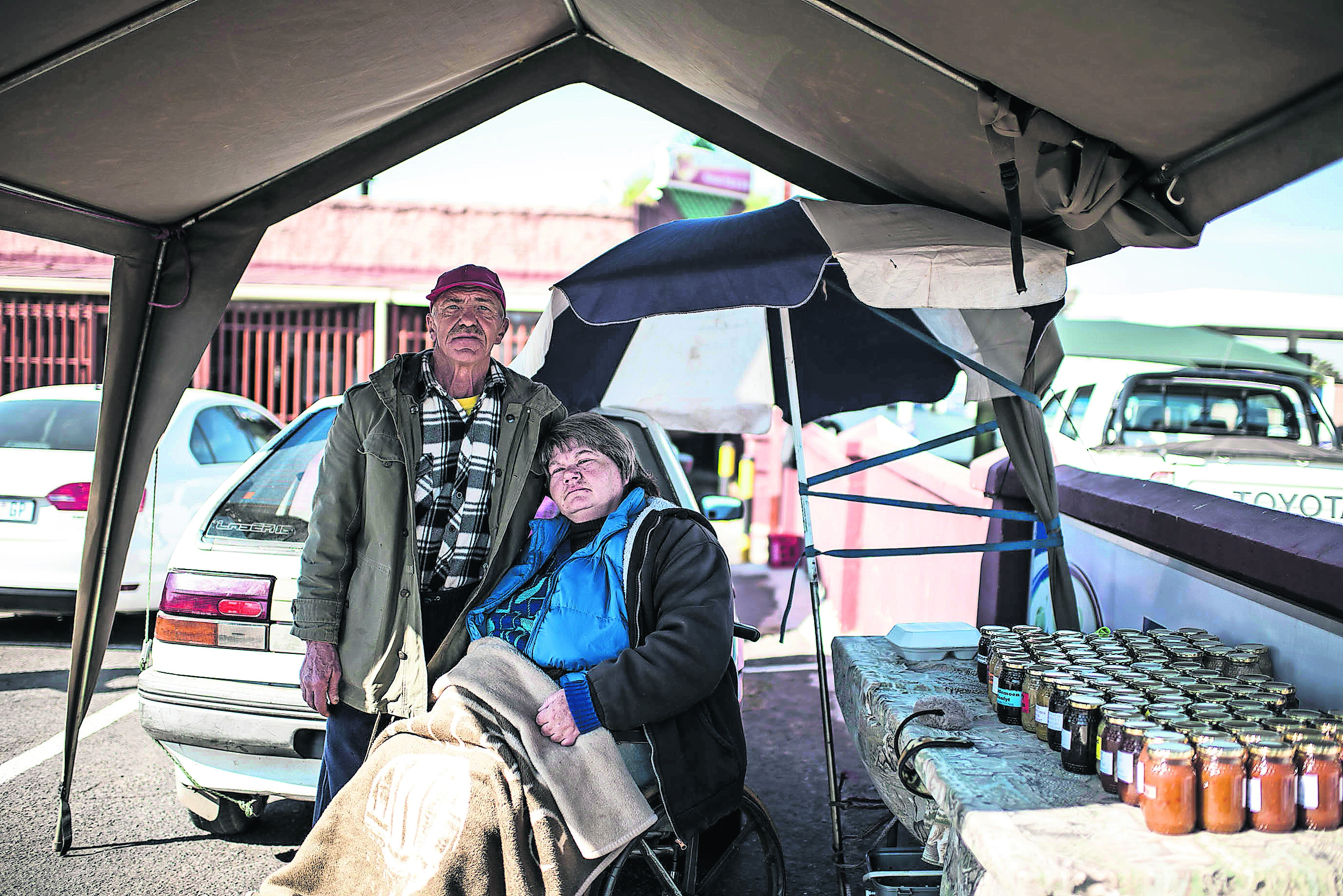The outcome of the ANCs long-awaited KwaZulu-Natal conference was a win for the Thuma Mina crowd. (Delwyn Verasamy/M&G)
The words “certificate for long service” and the number 42 are embossed in gold on the otherwise white document Kgaba-tsetse John Mofokeng holds proudly in his hands. It has been neatly stored away in an envelope for the past 17 years and looks as if it was fresh off the printing press.
Mofokeng’s first and only job was with the South African Railways and Harbours, which was later restructured to create Transnet. He started work on March 11 1958. He was 18 years old and fresh out of high school.
Over 42 years, Mofokeng worked his way up from a ticket examiner at Park Station to a train yard official in Pretoria West. He wore a dapper black uniform every day and eventually retired in 2000 when he turned 60.
“They came from Pretoria to make a braai for me,” he reminisces. “I was happy, they were happy. They said, ‘you are a good worker’’. I was an example to my co-workers that they must ‘do the same as John — the way he worked so hard’.”
But that recognition has faded with every monthly pension cheque he receives. Today, it is not enough to pay the bills.
“They took the lights. It’s black out here. I’m using candles. You can just imagine. And, when I want to cook something, it’s a paraffin stove. It’s not healthy.”
He is standing over a rickety dining-room table in his modest Atteridgeville house.
His R4 300 a month payment is just enough to cover his funeral policy, groceries for himself and his two grown children and municipal costs — sometimes. “When I’m able, I give the municipality R1 000. Well, when I cannot afford to, like this month, I only paid R700.

[Kgabatsetse John Mofokeng wants to enjoy what is rightfully his before he dies. (Alyssad Rivas and Paul Botes/M&G)]
“I wouldn’t say that I did expect so much from Transnet. I was just waiting to get what they offer me. But when time went on, I saw, no, this money that I’m getting here, it’s very little.”
This is also the case for the about 80 000 pensioners who, in 1990, were moved to two Transnet pension funds (based on when they retired), when Transnet became the legal successor of South African Transport Services. The government at the time promised that employee pension fund benefits would not be changed in any way and undertook to ensure that the pay-outs would keep up with inflation.
But the fund was found to be undercapitalised by R17-billion at the time and this legacy debt became a financial burden on Transnet. In 2000, the funds were closed to new contributors and, in accordance with the fund rules, the pension pay-outs grow at just 2% a year. As a result, payments are falling woefully short of inflation and it has left Transnet’s elderly former employees in a worsening situation.
The fund’s disappointing pay-outs — aggravated by allegations of mismanagement — are the subject of a legal challenge, which claims the legacy debt owed to pensioners (calculated at compound interest of 12% a year) has grown to an estimated R100-billion. This suggests that, on average, each of the 80 000 pensioners is owed R1.25-million by the fund.
According to the legal team representing the pensioners, in 2013, 80% of pensioners earned less than R4 000 a month, 62% received less than R2 500 a month and 45% were earning less than the government old-age grant of R1 600 a month. Some pensioners receive R1 a month after deductions such as contributions to the Transmed Medical Fund.
‘They are dying’
But the legal challenge has faced many delays since it was launched in April 2013 and an estimated 22 000 Transnet pensioners have died.
“They are dying,” Alina Rabasotho exclaims. “Transnet are just waiting, just to decrease the number.”
Rabasotho is the widow of a Transnet pensioner. Her husband worked for the railway for 28 years but, after a stroke, he was placed on early retirement. He died on Good Friday last year, at the age of 71. As a widow, Rabasotho now receives 70% of the full pension payment, which amounts to R2 000 a month.
“I’m doing nothing with that R2 000,” she says, noting her municipal service costs are R800 a month.
Sitting on a pink couch in her Saulsville home, Rabasotho is flank-ed by Ramaesela Violet Motana and Raesibe Sarah Ngobene, who are 78 years old, also widows and recipients of Transnet pensions. A crucifix hangs on the wall above them.

[Alina Rabasotho would like an indoor toilet. Pieter Olivier and Margaret Ludick (below) would like to buy their house – or retire to Henties Bay. (Alyssad Rivas and Paul Botes/M&G)]
A notification on Motana’s phone shows she received just R941.11 last month from the pension fund. Ngobene received R1 007. Her pension helps to support her son, his wife and their four children.
One of the few assets she has is her late husband’s Spoornet (now called Transnet Freight Rail) branded watch, which she wears, the strap secured by an elastic band.
The income of the three widows is supplemented by a government pension, which contributes another R1 600 to their monthly income.
There is a noise outside as two old men shuffle through the gate. The feisty Rabasotho and her friends mutter among themselves as they watch the men slowly make their way into the house.
“When they die, Transnet wins,” Rabasotho says. “They are old!”
Joseph Molekoa (84) takes a seat inside. He was a clerk for 35 years. He has been on pension for 23 years and receives R3 500 a month. He gets a government pension too.
“I don’t survive. I’m paying almost R2 000 rent,” he says, referring to municipal services.
Rabasotho chimes in: “Can you think what people can do with R3 500 a month. Bread is R15 now.”
Molekoa says: “We started very badly; we were earning in those days R12 per month as a black man doing the same job as a white. You get paid less, he gets more — almost three times more than you get. It continues into this here now.”
Many of the pensioners have cancelled their medical aid with Transnet but a funeral policy remains top priority for some.
For Mofokeng, it is his largest single expense every month. “Clientele — they did bury my wife with dignity. You know, that’s why I say those people are alright; I guarantee them.”
Rabasotho pays the policy for herself and for one of her sons. She and the other pensioners say they can’t depend on their children to help them.
“They have their own lives,” she says, adding that her one son does in fact work. “I don’t blame him. He has children and his wife is not working, the one is at the university. University fees are so expensive.”
Mofokeng’s daughter, who graduated with a law degree from Unisa, worked before she became ill. He now supports her. “It is painful, really,” he says, overcome by emotion.
Transnet’s piggy bank
The pension fund issue is an ongoing saga, with more twists and turns and technicalities than most of its victims can remember.
The deficit in the funds was first discovered by an actuarial assessment conducted just before Transnet was created. Some action was initially taken by Transnet to fulfil its debt obligation to the pension fund, but this put a strain on the parastatal. Any gains were reversed by questionable management decisions, such as selling assets that belonged to the fund, which resulted in a loss.
A parliamentary process came to the conclusion in 2010 that money should be paid into the funds, but this never materialised.
In April 2013, the legal team took up the case pro bono and the challenge is ongoing.
“Transnet was in financial dire straits since its inception, and it gave a lot of packages to people,” says Anton Alberts, a Freedom Front Plus MP who has been fighting for the pensioners for years. “Transnet was using it as piggy bank, taking money out and not repaying.”
This was possible because the fund had its own rules and falls outside the ambit of the Pension Funds Act. “The employer had complete control over the pension fund and could do whatever they want without proper accountability.”
Transnet said the funds are governed by the Transnet Pension Fund Act, as amended, and the 2% increase is statutory and in line with the rules.
“However, in an effort to ensure that our pensioners’ incomes track the rising cost of living, the funds have been supplementing the guaranteed statutory annual increases with a 13th cheque every year and ad hoc bonus payments where possible,” says Peet Maritz, the principal officer of the funds. These have been paying bonuses of between 8.3% and 11% of an individual’s annual pension and to date these bonuses have amounted to more than R3-billion.
According to Maritz, the funds had a surplus of over R8-billion but “the surplus in the funds is managed closely to ensure all obligations of the funds can be settled over the life- time of the funds”.
But Alberts argues that the pensioners are entitled to the surplus. “It is their money,” he says.
Pension amount ‘an insult’
A cold front has rolled in and the sky over Randfontein looks ominous. The wind whips up sand from a large mine dump — the last landmark before the turn into West Village. This old mine housing complex is where Pieter Olivier and his partner of 17 years, Margaret Ludick, live. Most days the pair are out and about to make money, but today it is just too cold to go anywhere.
Both Olivier and Ludick were in accidents, which were seven years apart. Ludick has lost the feeling in her legs and is largely wheelchair- bound. Olivier’s incident cost him his hearing and so Ludick does most of the talking.
Olivier started working at the Braamfontein train yard when he was just 16 — he was the “smallest out of everybody”.
“I was a leading shunter there. So that is, you take the coaches, you put them all together and make a train up, and check that everything is right. When you kick the coach off, you run next to it and turn its brakes on,” Olivier explains as he rubs his hardened and worn hands.
“It’s very dangerous — a lot of my mates they lost legs and arms and that. I was one of the lucky ones who never lost a leg or an arm.”
But on one fateful day in 1989, he found himself with a broken back under a heap of railroad trucks. Wheelchair-bound and of no use to the company, Olivier was put on early pension. The first cheque was R100.
“It wasn’t actually money you could use. I would fix peoples’ cars to pay my water and lights and those things,” he says. Today the pension is R1 500 after medical aid is deducted.
Olivier and Ludick cover their expenses — the biggest one being R5 000 for rent — by selling jars of preserves at traffic intersections. Many of the recipes come from a worn copy of Kook en Geniet.
“I have got a basket on the wheelchair with the jars in — and I’m sitting in that wheelchair the whole fucking day,” Ludick says, frustrated and emotional. “I wet myself every day because there is no place we can go to the toilet. Every day I sit in my pee,” she says.

[Pieter Olivier and Margaret Ludick would like to buy their house – or retire to Henties Bay. (Alyssad Rivas and Paul Botes/M&G)]
Ludick has been diagnosed with breast cancer but won’t go in for surgery for fear that Olivier will be unable to cover the rent alone. The pair have now also started selling jaffles at the roadside. “If I can get three months’ rent in advance, then I can go to the hospital and have my operation.”
Asked about rumours that many Transnet pensioners had committed suicide, Ludick admits she entertained the thought just a month ago.
“People weren’t supporting us. I was sitting there next to the road and I told him, ‘I sommer do something, just remove myself from Earth’, then life might be easier for him. He can go stay in a small flat or whatever. I don’t know if that’s true, but that’s how I feel. I feel I’m really tired.”
Olivier says he enjoyed his time at Transnet but he sees the pension as an insult. “For all the times that you worked hard, the long, long hours, the times you worked 18 hours or even 24 hours, I feel it’s an insult what they have done to us.”
Ludick says pensioners could blame Transnet for their circumstances. If their pensions were better and up-to-date, then “these problems wouldn’t be that bad, honestly”.
Pensioners’ dreams
In 2014, the pensioners and their legal team successfully obtained a court order allowing for the case to go ahead as a class action against Transnet. In 2015, summonses were served on both pension funds and Transnet.
But Transnet was successful in obtaining an exception to the particulars of the claim that relate to an argument based on a Constitutional Court judgment, which ruled that, if government makes a commitment, you needn’t prove that a contract was created. This ruling has now been subject to a number of appeals by the pensioners’ legal team and, on November 16, yet another appeal will be heard by the Constitutional Court.
But even if the pensioners’ claim is ultimately successful, the state will not be able to afford the R100-billion. It is already hard-pressed just to find the R15-billion anticipated bailout for SAA while it tries to keep its debt levels in check for fear of yet another credit rating downgrade.
The pensioners gathered in Rabasotho’s lounge agree that a back payment would be better late than never. Rabasotho wants only one thing: “My house, it is incomplete. I don’t have a toilet inside.”
Back at his home in Atteridgeville, Mofokeng hopes only that, if justice is forthcoming, it comes quickly. “Let me enjoy my fruit. I cannot say that, now, okay, when I die my children will enjoy, but then they didn’t work for it. I worked for it. I must enjoy before I die.”
A better life for Olivier and Ludick would be a million-rand lump sum, she says. “Then we can buy this house. We can buy a proper bakkie and trailer again so we can be more mobile with our stuff.”
If Olivier came into even more money than that, they will hotfoot it to Henties Bay, a small town in western Namibia, where an old tin mine has filled with salt water.
“In the water are all salt crystals and all over your body you are white, white. It makes you warm all over, it feels like something moving into your body. There’s a lot of minerals in there,” Ludick enthuses. “That’s an experience, I’m telling you. If you go there, you sommer stay there.”